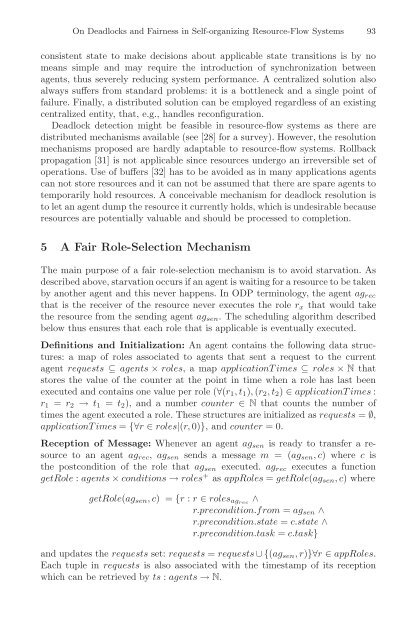Architecture of Computing Systems (Lecture Notes in Computer ...
Architecture of Computing Systems (Lecture Notes in Computer ...
Architecture of Computing Systems (Lecture Notes in Computer ...
You also want an ePaper? Increase the reach of your titles
YUMPU automatically turns print PDFs into web optimized ePapers that Google loves.
On Deadlocks and Fairness <strong>in</strong> Self-organiz<strong>in</strong>g Resource-Flow <strong>Systems</strong> 93<br />
consistent state to make decisions about applicable state transitions is by no<br />
means simple and may require the <strong>in</strong>troduction <strong>of</strong> synchronization between<br />
agents, thus severely reduc<strong>in</strong>g system performance. A centralized solution also<br />
always suffers from standard problems: it is a bottleneck and a s<strong>in</strong>gle po<strong>in</strong>t <strong>of</strong><br />
failure. F<strong>in</strong>ally, a distributed solution can be employed regardless <strong>of</strong> an exist<strong>in</strong>g<br />
centralized entity, that, e.g., handles reconfiguration.<br />
Deadlock detection might be feasible <strong>in</strong> resource-flow systems as there are<br />
distributed mechanisms available (see [28] for a survey). However, the resolution<br />
mechanisms proposed are hardly adaptable to resource-flow systems. Rollback<br />
propagation [31] is not applicable s<strong>in</strong>ce resources undergo an irreversible set <strong>of</strong><br />
operations. Use <strong>of</strong> buffers [32] has to be avoided as <strong>in</strong> many applications agents<br />
can not store resources and it can not be assumed that there are spare agents to<br />
temporarily hold resources. A conceivable mechanism for deadlock resolution is<br />
to let an agent dump the resource it currently holds, which is undesirable because<br />
resources are potentially valuable and should be processed to completion.<br />
5 A Fair Role-Selection Mechanism<br />
The ma<strong>in</strong> purpose <strong>of</strong> a fair role-selection mechanism is to avoid starvation. As<br />
described above, starvation occurs if an agent is wait<strong>in</strong>g for a resource to be taken<br />
by another agent and this never happens. In ODP term<strong>in</strong>ology, the agent agrec<br />
that is the receiver <strong>of</strong> the resource never executes the role rx that would take<br />
the resource from the send<strong>in</strong>g agent agsen. The schedul<strong>in</strong>g algorithm described<br />
below thus ensures that each role that is applicable is eventually executed.<br />
Def<strong>in</strong>itions and Initialization: An agent conta<strong>in</strong>s the follow<strong>in</strong>g data structures:<br />
a map <strong>of</strong> roles associated to agents that sent a request to the current<br />
agent requests ⊆ agents × roles, amapapplicationT imes ⊆ roles × N that<br />
stores the value <strong>of</strong> the counter at the po<strong>in</strong>t <strong>in</strong> time when a role has last been<br />
executed and conta<strong>in</strong>s one value per role (∀(r1,t1), (r2,t2) ∈ applicationT imes :<br />
r1 = r2 → t1 = t2), and a number counter ∈ N that counts the number <strong>of</strong><br />
times the agent executed a role. These structures are <strong>in</strong>itialized as requests = ∅,<br />
applicationT imes = {∀r ∈ roles|(r, 0)}, andcounter =0.<br />
Reception <strong>of</strong> Message: Whenever an agent agsen isreadytotransferaresource<br />
to an agent agrec, agsen sends a message m = (agsen,c) where c is<br />
the postcondition <strong>of</strong> the role that agsen executed. agrec executes a function<br />
getRole : agents × conditions → roles + as appRoles = getRole(agsen,c)where<br />
getRole(agsen,c) = {r : r ∈ rolesagrec ∧<br />
r.precondition.from = agsen ∧<br />
r.precondition.state = c.state ∧<br />
r.precondition.task = c.task}<br />
and updates the requests set: requests = requests ∪{(agsen,r)}∀r ∈ appRoles.<br />
Each tuple <strong>in</strong> requests is also associated with the timestamp <strong>of</strong> its reception<br />
which can be retrieved by ts : agents → N.


